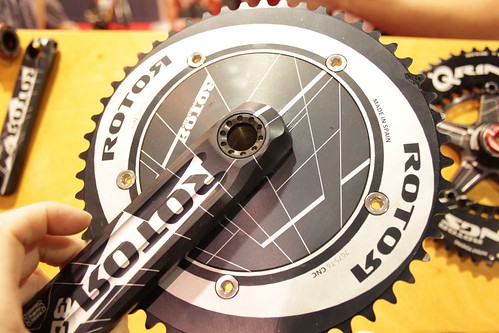All I want for Xmas is 50 front teeth: Rotor track crank
Among the cool stuff I saw at Interbike, I really had a thing for Spanish component maker Rotor. Rotor makes high-end CNC’ed alloy parts that are seen on a lot of pro bikes such as Garmin-Cervelo, and they are also technical partners with Cevelo. Rotor’s 3D crankset is available in a track version. The 3D’s crank arms are bored out in three channels the length of the arms to reduce weight, and the disc-like spider is beautifully relieved of excess material on the inside face. With a 144mm bcd, the crank is designed to take standard track rings, or track versions of Rotor’s own ovalized “Q-Rings”. The 3D track crank is a 2-piece with external bearing bottom bracket, much like the majority of current road cranks and SRAM’s Omnium track crank, but the 3D track crank requires its own specific BB. It differs from Rotor’s regular BB (which is compatible with Shimano cranksets) by having steel cups and from what I can tell, a narrower profile. Apparently, this is done to bring the chainring spider in tight enough to achieve standard chainline for track components. Though the track BB looks significantly different from the regular BB, Rotor assured me that it uses the same installation tool.
If Shimano is the best at cold-forging bike components, there’s a good argument that Rotor is tops for CNC. Of course, eecycle Works does some amazing things, such as the eebrake that Byron reviewed and they are steadily working on a CNC crank of their own, but Rotor offers stuff that balances exotic with accessible and excellence with a reasonable cost. Sure, $415 for a crankset without rings isn’t nothing, but it is on par with the best from Shimano and SRAM, and the 3D cranks (including road, track, and mtb versions) will accept standard rings. The BB30 3D Plus cranks are a bit pricier at $660.
